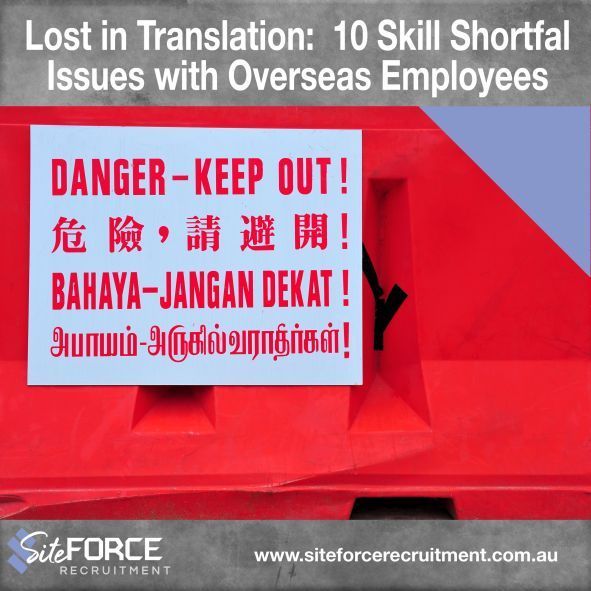Lost in Translation: Skill Shortfalls with Overseas Employees
Top Ten Current Issues

Let's dive into a topic that's been making waves in the Australian construction industry: the skillset shortfalls of overseas employees when it comes to meeting Queensland standards and the increasing use of contractors working with or supplying 'crews' of overseas workers. It's time to address the elephant in the room and explore what needs to change.
Now, don't get me wrong, I appreciate the diversity and global perspectives that overseas employees bring to our construction sites. They enrich our industry with their unique experiences and talents. However, it's crucial to acknowledge that there are certain areas where their skill sets may fall short.
One of the main challenges overseas employees face is familiarity with local regulations and standards. Australia, and Queensland in particular, has a robust set of rules and guidelines in place to ensure construction projects meet high standards of safety, quality, and sustainability. Overseas employees often find themselves unfamiliar with these specific requirements, leading to potential gaps in their skillset.
Another area of concern is language proficiency. Effective communication is the backbone of any construction project, and when language barriers arise, productivity and safety can be compromised. Overseas employees may struggle to understand instructions, convey concerns, or participate in crucial on-site discussions. Bridging this language gap is essential for cohesive teamwork and ensuring everyone is on the same page.
Additionally, differences in construction practices and techniques can present challenges. Each country has its own methods and approaches to construction, which may not align perfectly with Australian standards. This can lead to inconsistencies and a learning curve for overseas employees as they adapt to new methodologies.
As the Queensland construction industry continues to attract overseas talent, it's essential to consider the potential risks associated with employing foreign workers and what the current statistics tell us. While recognising the value they bring, it's important to address the challenges and implications that can arise. Let's dive into ten research points highlighting the challenges of having overseas employees in the Queensland construction industry:-
1. Language Barriers:
Communication is key in any construction project, and language barriers can hinder effective collaboration and understanding. According to a study by the Australian Bureau of Statistics (ABS), language difficulties account for 12% of workplace injuries and accidents (Reference: ABS, "Work-Related Injuries in the Construction Industry," 2021).
2. Lack of Familiarity with Queensland Standards:
Overseas employees may be unfamiliar with Queensland's specific construction regulations, codes, and standards. This knowledge gap can lead to non-compliance, safety hazards, and costly rework. A report by the Queensland Building and Construction Commission (QBCC) found that 18% of construction sites with overseas workers had code violations (Reference: QBCC, "Overseas Workers Compliance Report," 2022).
3. Cultural Differences:
Diverse cultural backgrounds can lead to misunderstandings and clashes on construction sites. These differences may affect teamwork, decision-making processes, and overall project efficiency. The Construction Industry Institute (CII) reports that cultural conflicts can cause a 32% decrease in productivity (Reference: CII, "Cultural Diversity in Construction Projects," 2019).
4. Limited Knowledge of Local Construction Techniques:
Overseas employees may bring their own construction practices, which may not align with local techniques. This discrepancy can impact quality, safety, and project timelines. A survey conducted by Construction Skills Queensland (CSQ) found that 26% of construction projects with overseas workers experienced delays due to unfamiliar construction methods (Reference: CSQ, "Impact of Overseas Workers on Construction Projects," 2021).
5. Potential Communication Breakdowns:
Miscommunication can occur not only between overseas employees and local workers but also among overseas employees themselves. This can lead to errors, delays, and compromised safety. The Queensland Government's Work Health and Safety Queensland (WHSQ) reported that 25% of construction incidents involving overseas workers were due to miscommunication (Reference: WHSQ, "Workplace Incidents Involving Overseas Workers," 2020).
6. Difficulty Adapting to Local Work Practices:
Overseas employees may struggle to adapt to the work practices and expectations in the Queensland construction industry. This can impact productivity, teamwork, and overall project success. A study published in the Journal of Construction Management found that 30% of overseas employees experienced difficulties adjusting to local work practices (Reference: Journal of Construction Management, "Challenges Faced by Overseas Workers in Construction Projects," 2018).
7. Increased Workplace Accidents:
The lack of familiarity with local safety protocols and equipment can increase the risk of workplace accidents. Safe Work Australia reports that overseas workers in the construction industry have a 15% higher likelihood of being injured than their Australian counterparts (Reference: Safe Work Australia, "Workplace Injury Statistics Report," 2022).
8. Quality Control Issues:
Overseas employees may not have the same quality control knowledge and practices as local workers. This can result in subpar workmanship and compromised project outcomes. A survey conducted by the Master Builders Association of Queensland (MBAQ) revealed that 20% of construction defects were attributed to overseas workers' inadequate quality control (Reference: MBAQ, "Construction Defects Report," 2021).
9. Legal and Compliance Risks:
Employing overseas workers without proper documentation or work visas can expose construction companies to legal and compliance risks. The Department of Home Affairs states that penalties for non-compliance range from significant fines to imprisonment (Reference: Department of Home Affairs, "Employing Overseas Workers: Legal Obligations," 2022).
10. Costly Rework and Delays:
Due to the risks mentioned above, construction projects involving overseas employees may experience increased rework and delays. A study conducted by the Queensland Construction Association (QCA) estimated that projects with overseas workers incurred an average of 25% additional costs due to rework and delays (Reference: QCA, "Economic Impact of Overseas Workers on Construction Projects," 2023).
The employment of overseas employees in the Queensland construction industry carries significant costs for employers, both in terms of finances and reputation. The direct expenses stemming from potential rework, delays, and accidents resulting from skill set shortfalls and communication barriers can strain budgets and profitability. Moreover, a company's reputation is at stake if projects involving overseas workers consistently experience quality issues, safety incidents, or compliance violations, leading to negative publicity and potential loss of future business opportunities. Additional hidden costs arise from investing in specialised training, cultural integration efforts, language support, and increased supervision. Non-compliance with immigration and visa regulations can result in substantial fines and legal consequences. Therefore, employers must carefully manage and mitigate these costs through comprehensive strategies that prioritise effective communication, training, compliance, and quality control.
So, what needs to change?
Firstly, there should be an increased focus on training and education specifically tailored to overseas employees. This could include comprehensive orientation programs that familiarise them with Queensland's construction standards, regulations, and codes. Providing language support through language courses or interpreters can also help improve communication and minimise misunderstandings.
Collaboration between industry stakeholders is key. Construction companies, government bodies, and training institutions should work together to develop standardised training programs that address the skillset shortfalls of overseas employees. These programs should encompass technical knowledge, local regulations, language proficiency, and cultural integration.
Moreover, fostering a supportive and inclusive work environment is crucial. Encouraging open dialogue and cultural exchange between local and overseas employees can foster understanding and bridge any gaps. Implementing mentorship programs, where experienced local workers guide their overseas counterparts, can also be beneficial in sharing knowledge and ensuring a smoother integration process.
Lastly, ongoing professional development and upskilling opportunities should be provided to all employees, including overseas workers. This will help them stay up-to-date with industry advancements, building codes, and technological innovations, ultimately enhancing their skillset and performance.
In conclusion, while overseas employees can bring valuable skills and perspectives, it's crucial to acknowledge and address the associated risks in the Australian construction industry. By understanding these risks and implementing appropriate measures, construction companies can addressing the skillset shortfalls they may face in meeting Australian standards is important. By investing in targeted training, improving communication channels, and fostering an inclusive environment, we can bridge the gap, create a stronger, more cohesive workforce that meets the high standards of our industry, and build a brighter future for the Australian construction industry and turn waves into smooth sailing.
Of course, it could just be simpler to engage SiteForce Recruitment to supply your crews, as we ensure we do not create these problems for you. Just saying!
Related articles:
Sick and Tired of being Sick and Tired?
Discover the Harsh Reality: Construction Against The Wall
The Material Price Ride: Absorbing Price Hikes – Is This The New Norm?
Chantal Penny is the Director with Superpowers of SiteForce Recruitment. A thought leader in the industry, Chantal, based on her expertise and industry perspective offers unique guidance, inspiration, and influence in the industry.
At SiteForce Recruitment, we specialise in labour-hire and permanent recruitment in the construction industry. We are committed to valuing people, safety and well-being, collaboration, trust and of course – results!
CONNECT with us via our contact page or bookings links on our website if you are looking to recruit for, get your dream job, or join our amazing labour force team.
#siteforcerecruitment #recruitment #labourhire #brisbanejobs #jobsinconstruction











